~ A GIF-HEAVY EXPLORATION OF FEMINISM & FASHION IN GREASE 2 ~
Many of you will not be acquainted with one of my all-time favourite films: a little sequel by the name of Grease 2.
Despite flopping spectacularly at the box office, and being scoffed at by critics worldwide, there is actually so much to love about this hyperbolic high school musical! Set back at Rydell High, two years after Sandy’s questionable transformation — relinquishing herself to the patriarchy and succumbing to peer pressure — Grease 2 follows the next generation of Pink Ladies and T-Birds as they navigate their way through the final year of school. It’s now the early sixties, the T-Birds ride motorcycles instead of cars, and the Pink Ladies are better dressed (not a poodle skirt in sight) with attitudes to match. The Pink Ladies pledge is, “to think cool, to act cool and to be cool…”
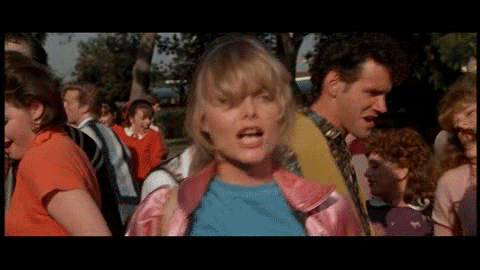
The love story journeys up the same vein as its predecessor except the gender roles are reversed: the ‘uncool’ boy transforms to win the heart of the popular girl — because she is not changing for any man.
Released in 1982, it’s the eighties’ appropriation of the sixties; possibly two of the most dynamic and least understated eras for twentieth-century fashion and music, causing an assault on your eyes and ears in the best kind of way. I imagine a 31-flavour ice cream fight in Baskin Robbins being not too dissimilar. The catchiness of the music is at a level that almost requires a frontal lobotomy if one doesn’t want to be singing the songs for weeks after viewing. The lyrics are fun, cheesy, and hilarious (and not always on purpose). Basically, every song is a thinly veiled euphemism for sex, such as the number loosely about bowling, aptly named Score Tonight. Sometimes there is no veil at all, which is the case for the songs Reproduction, and Prowlin‘.
There is no denying Grease 2 is tacky, cringeworthy, and, at times, poorly scripted — it definitely lies in the ‘so-bad-its-good’ category. But when you peel back the layers of leather, cheesy one-liners, and teenagers who look like they should have graduated a decade prior, there is actually a worthwhile discovery to be made: the portrayal of so many strong and empowered female characters, both in front of and behind the camera.
The sixties is often heralded as the dawn of second-wave feminism in America and this is embodied by the female characters in the film. From its sassy supporting cast to the highly independent leading (Pink) lady, Grease 2 bestows its women with power, autonomy, and a sense of self-worth — not to mention three-dimensional personalities.
Patricia Birch, responsible for the choreography in Grease, went on to choreograph and direct Grease 2. Her dance routines are dynamic, vast, and well-executed, a testament to Birch’s eye and talent. The routines also demonstrate Birch’s incredible ability to work within the space she was provided and fill it to the brim with movement, shapes, and synchronicity.

For a woman to direct in the eighties was no small feat. This was affirmed in an article by the New York Times from 1981 (a year before Grease 2 graced the silver screen) which imparted shocking statistics garnered by female members of the Directors Guild of America. They discovered that of the 7322 feature films, released by the more major distributors over the last thirty years, only fourteen (one per cent) were directed by women.
Today, women are yet to break the metaphorical glass ceiling encasing the film industry, with an unremarkable amount of progress made since the eighties. This is highlighted by the 2017 Celluloid Ceiling report, also researched and compiled by women in film. Their purpose was to convey the severe disparity in the number of male versus female roles behind the camera, based on the top 250 grossing films in the United States. In 2017, women Directors accounted for a mere eleven per cent, and only racked up a total of eighteen per cent for all behind-the-scenes roles, inclusive (writer, director, producer, executive producer, editor, cinematographer). This, of course, does not take into account even further marginalised groups such as transgender women and WOC.
Not only did Patricia direct a major motion picture, she also had to work with an unfinished script at the time of production! She had also never directed a film with motorcycles, a typically masculine theme. In an interview with Brian Herzlinger, Patricia admitted to being terrified about filming the finale motorbike performance but also concluded it was her favourite scene to shoot.
Birch’s leading lady, Michelle Pfieffer, also enjoyed working with motorcycles in Grease 2, taking it upon herself to ride with the stuntman for the film.

Pfeiffer stars as the inimitable Stephanie Zinone, leader of the Pink Ladies and the epitome of cool. More importantly, she is a feminist who deems herself independent. She also declares she kisses who she wants, when she wants.
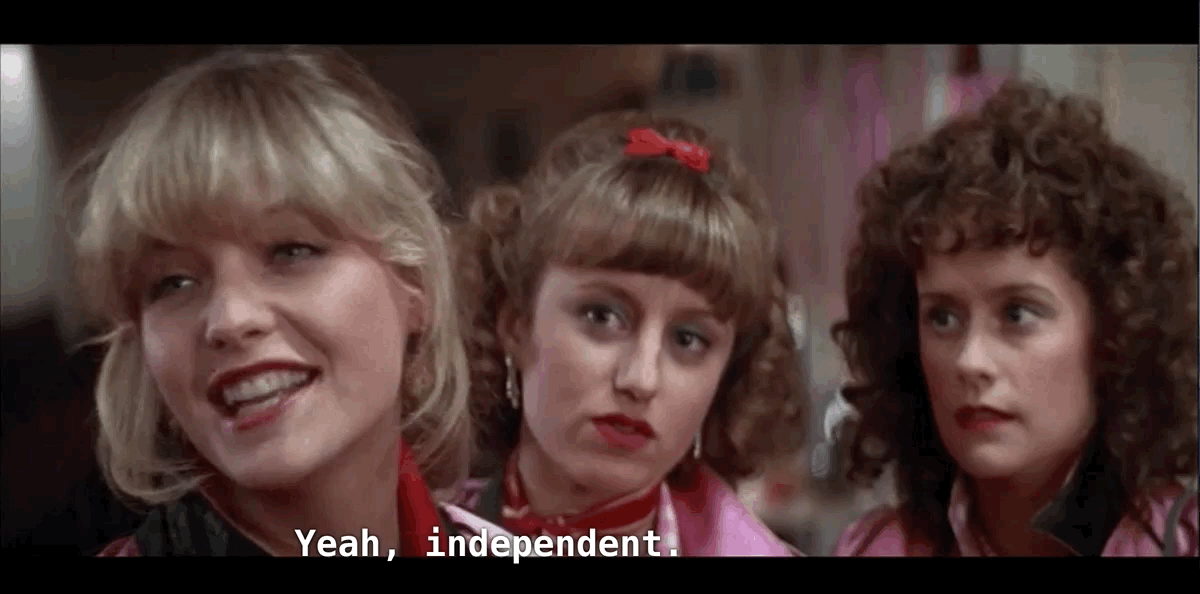
Zinone is inexorable when it comes to choosing a man and won’t settle for anything less. After our nerdy hero, Michael Carrington, repeatedly asks Stephanie out on a date she finally snaps and demands, “Look, when are you gonna get the picture?” And so begins one of the best songs in the film, Cool Rider, where Stephanie (very necessarily) straddles a ladder in order to tell Michael, “I don’t want no ordinary guy coming on strong with me, they don’t know what I’m looking for, they don’t know what I need.”
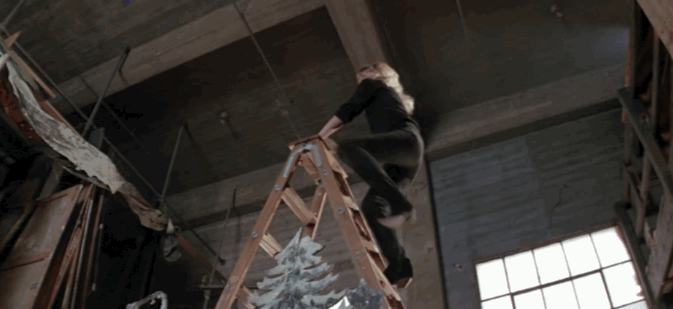
Stephanie literally spells out to Michael, in song, what she wants in a man: a C-O-O-L R-I-D-E-R. Michael knows she will not change for him; he also surmises if he is to have any chance with this headstrong woman he will need to make some adjustments of his own.
Stephanie stands up for what she believes in. She tears down the patriarchal stage to stand alongside men as their equal, in a world where men, namely the T-Birds, view women as property and trophies.
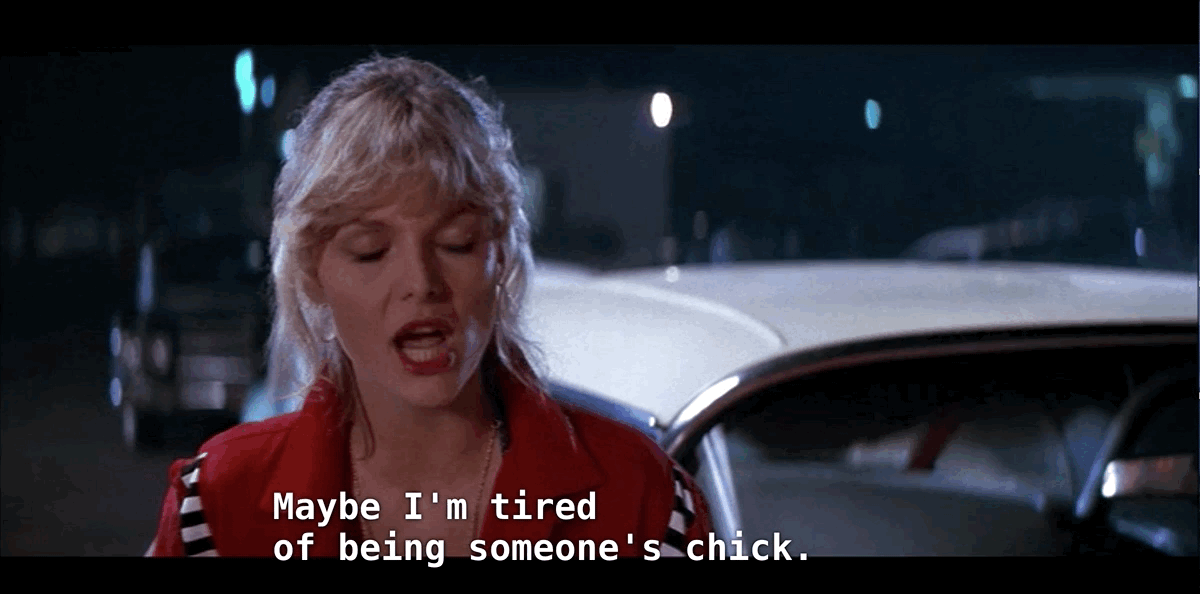
Gary Arnold from The Washington Post, back in 1982, also saw this move towards stronger, more well-rounded female characters in the musical sequel:
“The change [in tone] proves especially flattering to the female characters. The girls in this blithe, satirical exaggeration of high school mores in the early ’60s enjoy parity with the boys and they express an emotional integrity that their counterparts in Grease could only envy. At the same time, they exert more erotic force. The romantic longings that seemed synthetic when expressed in song or expression by Olivia Newton-John acquire a smoldering, savory conviction in Michelle Pfeiffer, who seems to combine suggestions of an embryonic Deborah Harry with a bouncy, giddy sweetness.”
Gary Arnold, 1982
Zinone’s after-school job is at Jake’s Service Station, a car garage, which is not a quintessential female occupation for any era, let alone the sixties. I am certain she would know how to check your oil and change a tyre! She also makes her work uniform look insanely cool.
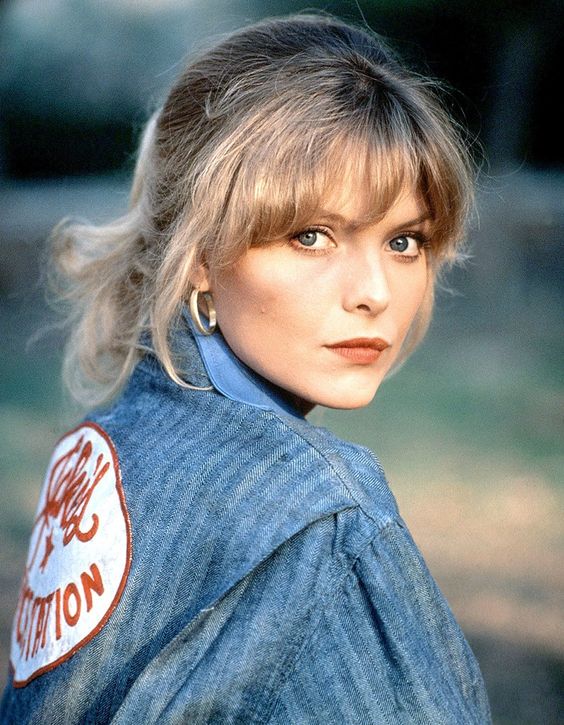

Sartorially, Stephanie dresses for herself, rather than for men (or anyone else). She literally wears the pants when all the other women in her class wear skirts, as displayed in the opening dance number.
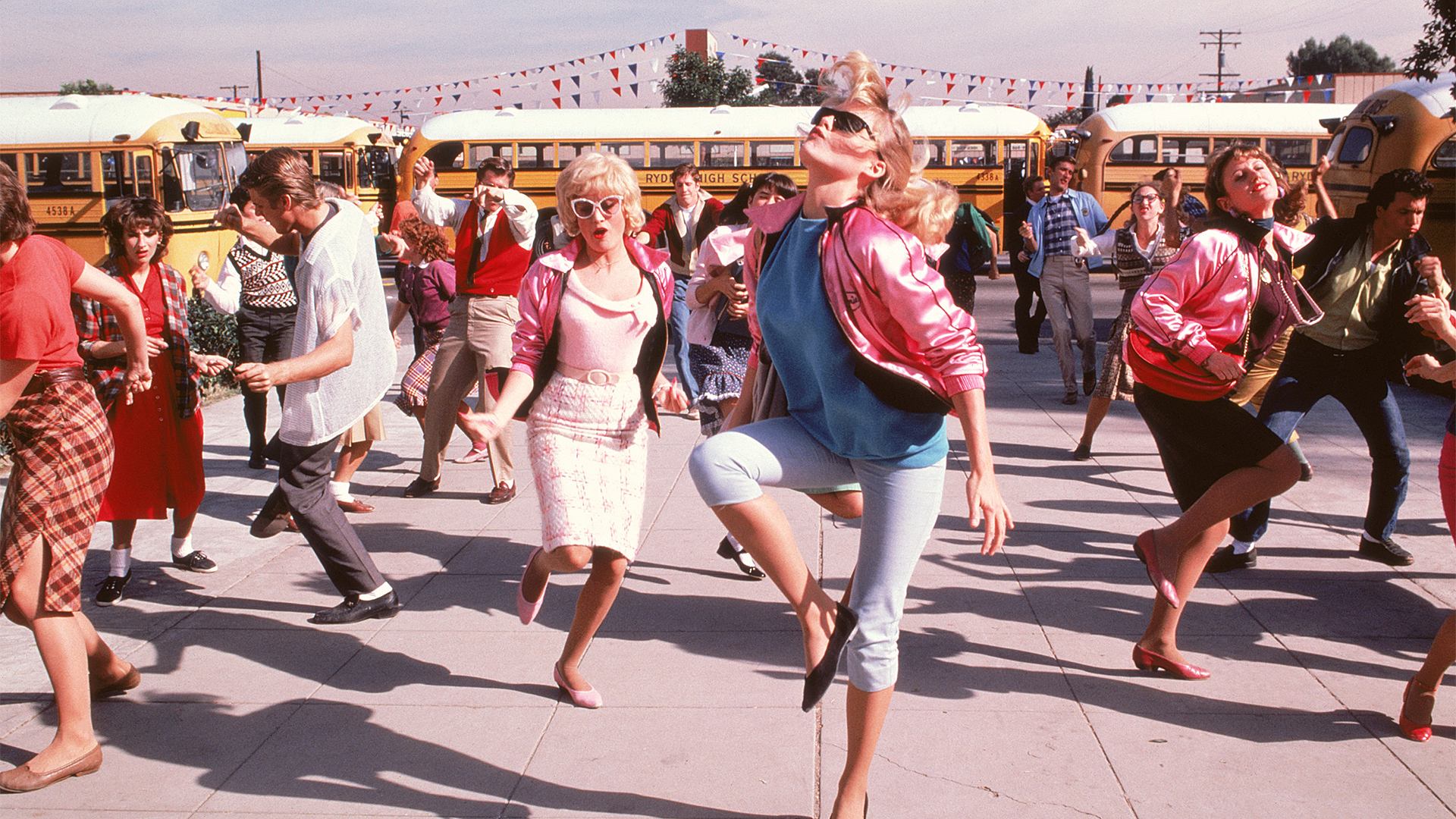
Later on, she dons all black, during Cool Rider, when everyone else is in candy hues. At the talent show, she dresses as a Christmas tree while her classmates perform in tutus and corsets.


During the start of her luau-themed prom, Stephanie rocks a sweatshirt, partly because she is depressed about her Cool Rider’s disappearance but also because she is her own person and generally dgaf.
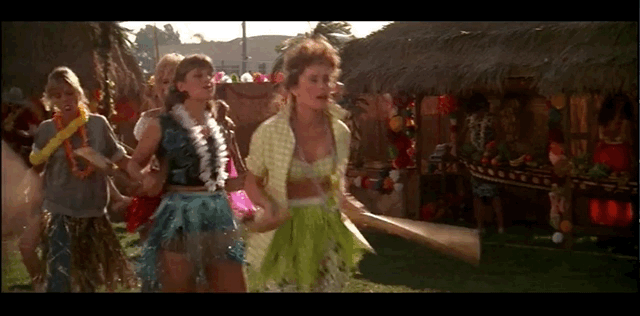
Stephanie’s style is about more than just ‘fashion’ or trends; her outfit recipe focuses on the method over the ingredients. There is a nonchalance in her attire, an air of perfectly thrown-togetherness with the right amount of scrunched or folded sleeves, jumper tied casually around her waist, perfect hoop earrings peeping through perfectly messy hair. Her big, black, sunglasses covering almost half her face were synonymous with ‘cool’ in the eighties and, like everything she wears in this movie, she manages to pull them off.

These sunglasses are also quite masculine and can be seen worn on many male heroes throughout cinematic history (check out some of them here). Stephanie’s casual style doesn’t mean she doesn’t know how to do glam.
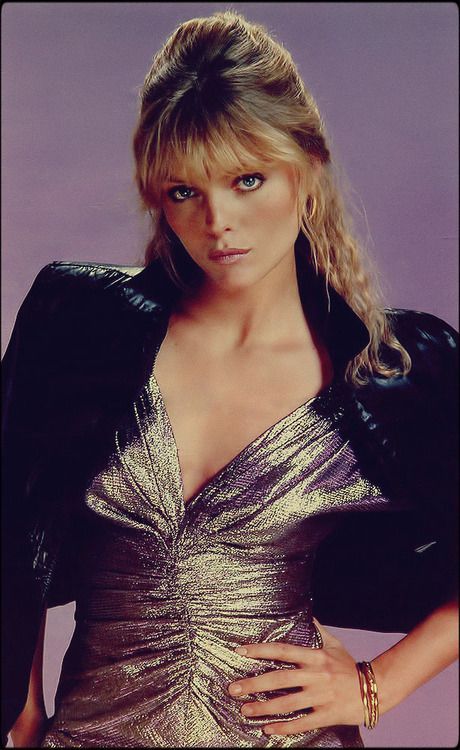
Stephanie’s fellow Pink Ladies also stoke the fires of feminism. Paulette (real-life daughter of Judy Garland and half-sister of Liza Minnelli), our Marilyn Monroe-esque character is sensual, caring, and exercises diplomacy among her friends.

She feels confident enough to assert her sexuality and doesn’t accept slut-shaming from her peers.
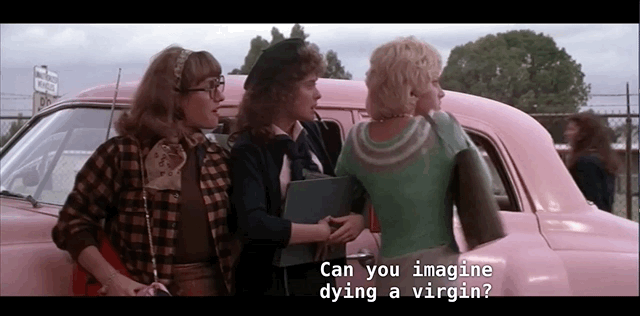
Paulette finds herself on the receiving end of uncool behaviour by her beau and leader of the T-Birds, Johnny Nogerelli, one too many times. At the talent show, Johnny demands she puts on more clothing, seeing Paulette as property and sexually objectifying her. He physically adds more layers of clothing on top of Paulette’s corset ensemble and she finally retaliates, “Well, you want to hear my final word, Mr Push-Everyone-Around Nogerelli? Maybe you can bully some chicks in this school, but this chick has been bullied for the last time.” Paulette proves that soft can also be strong.
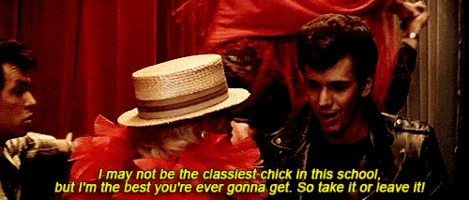
In the end, Johnny accepts Paulette for who she is, ever-so-eloquently declaring through song, “I like what you got, I guess it’s okay if you want to show it.” She replies, “I am what I am, and I’m all for you, just want you to know it.” Paulette is in touch with herself and her self-worth and knows she does not need to apologise for who she is, or how she goes about her business (including how she bowls).
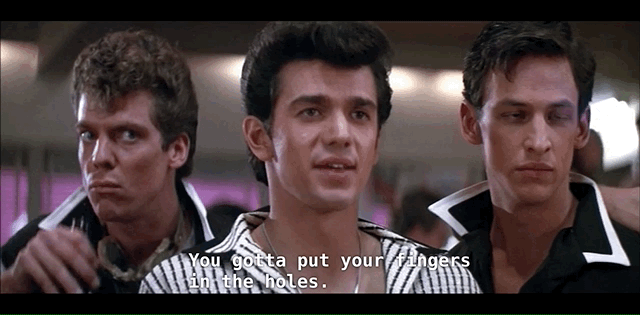
She also doesn’t need to apologise for how she dresses. Akin to her personality, Paulette’s attire is always colourful, sexy and fun. She uses clothing to celebrate her body and her femininity.
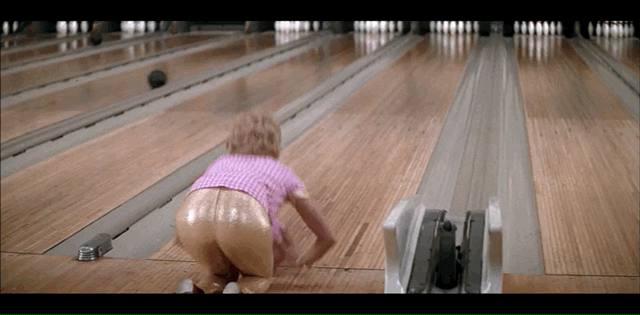
Paulette’s foil, Sharon – the Jackie Kennedy of the group – is forthright and assertive. She demonstrates leadership in many roles (such as overseeing the talent show performance) and has a keen interest in Pink Lady politics.
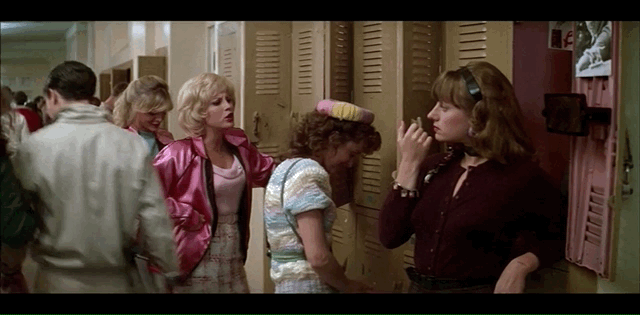
She is also a woman with resilience. Sharon is in constant battle with her boyfriend, T-Bird Lewis, against his incessant sexual advances. The film further posits the relationship as a battlefield through symbolic clothing, sets and lyrics: Lewis feigns nuclear war, whilst in a bomb shelter, in an attempt to trick Sharon into sleeping with him. This is, of course, done via song during the double-entendre duet, Do it for Our Country.
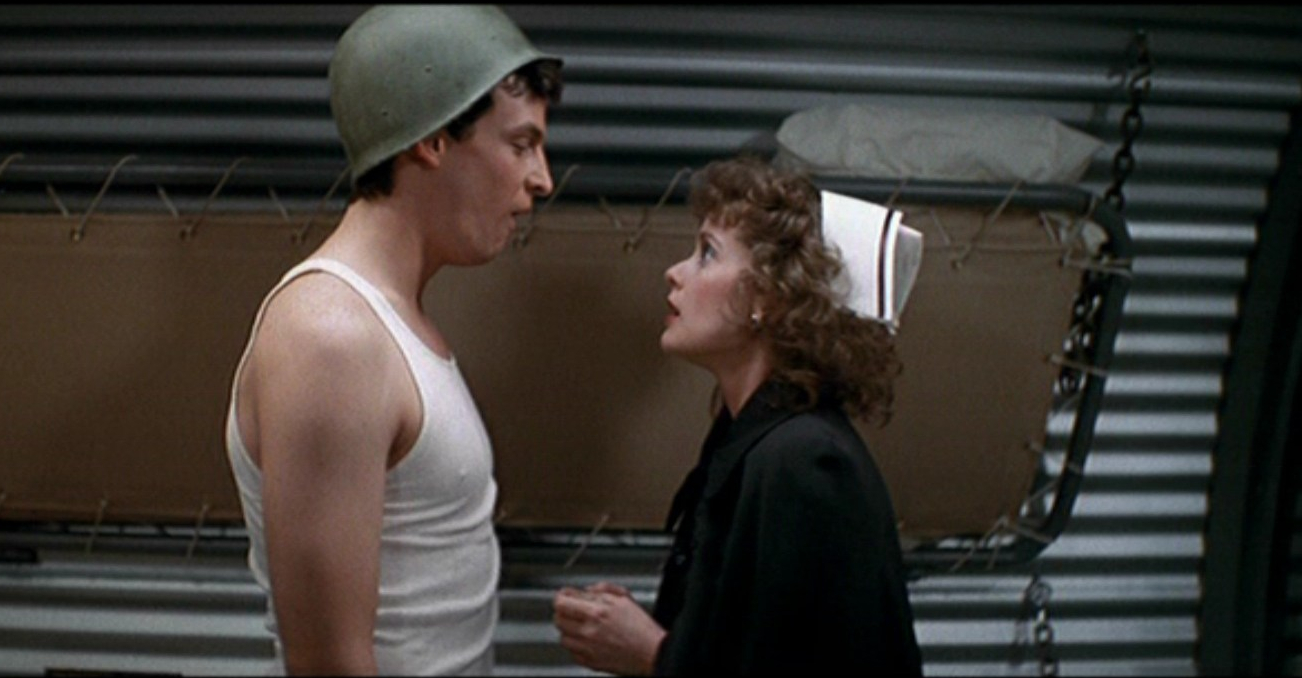
This walks a fine line between consent and something known as sexual deception or sexual fraud (read more about this here). Fiona Elvines, part of UK national charity, Rape Crisis, puts it rather succinctly during an interview for Vice Magazine: “If you need to trick someone into having sex with you, you’re a perpetrator.”
The moment Sharon realises what Lewis is doing she is disgusted and runs off. Lewis is left in the bomb shelter to be humiliated and laughed at by his friends, who were also in on the plan, sounding the fake siren just outside the bomb shelter.
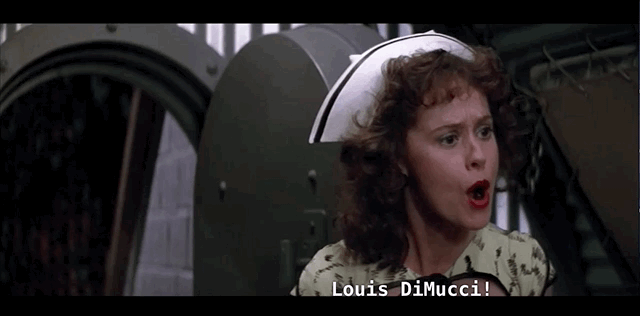
The fear of rejecting or embarrassing men is one of many reasons why women will often remain silent, or even comply, in situations mirroring the situation faced by Sharon. Historically, women have been known to take on this emotional labour in (mostly cis-heteronormative) relationships, learning this role mostly by simply witnessing the relationships around us, as though through osmosis.
Clementine Ford, in an article she wrote for the Sydney Morning Herald in 2018, uses Ariana Grande’s lack of reaction to Bishop Charles Ellis groping her breast, at Aretha Franklin’s funeral, to exemplify this point:
“Women learn to absorb a broad range of humiliations in order to prevent men from feeling exposed or foolish, and this example is no different. We go through that mix of emotions – disbelief, disgust, humiliation and fear – and choke it down, because causing embarrassment to a man by reacting against it is something we’re taught to feel is the worst of all things.”
Clementine Ford, 2018
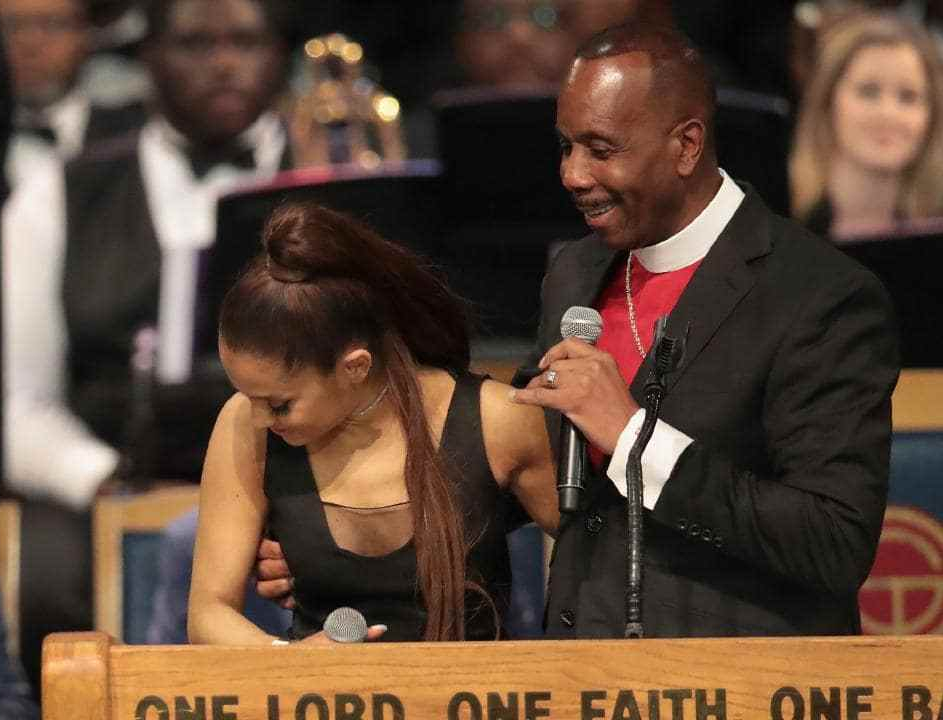

Later, during the graduation group song, Lewis laments in his (ironically) beautiful tenor singing voice, “Will I ever score?” to which Sharon replies sweetly, “There’s nothing wrong with just liking each other”. The fact Sharon continues to be so vocal about not being ready for a certain level of intimacy is of significance. And just because it is directed at her partner, rather than a stranger or acquaintance, does not dilute its importance. Alternatively, one could almost argue it demonstrates more conviction. People rarely want to hurt or disappoint the ones closest to them and, as a result, it is often in these relationships that we are far more likely, and willing, to carry emotional burdens and compromise our values and beliefs.
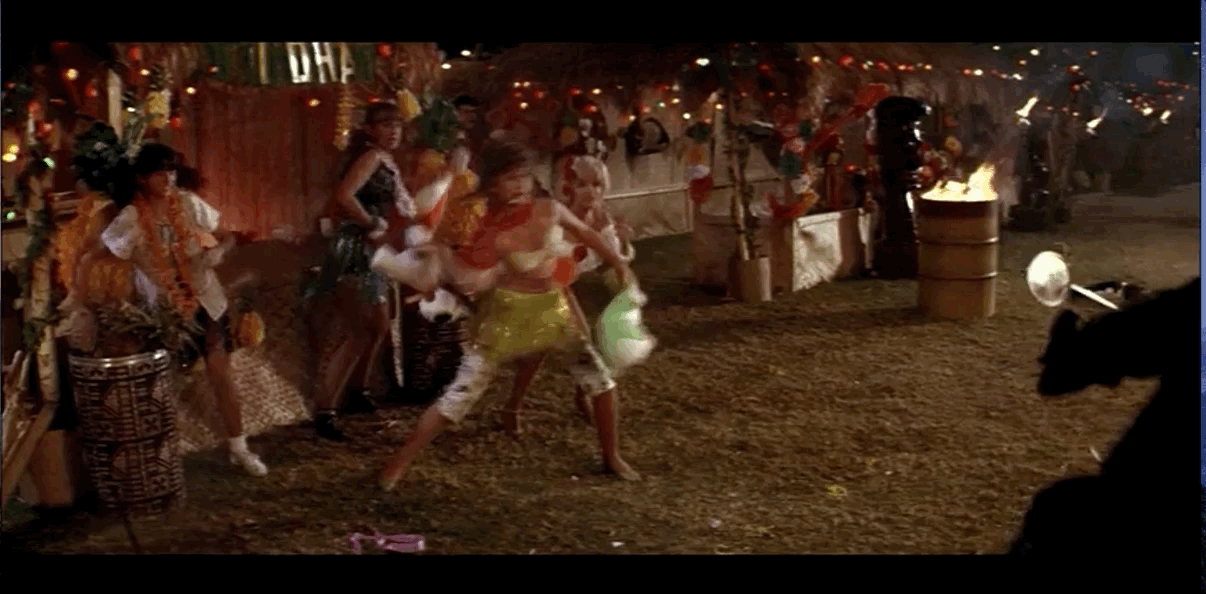
Sharon’s style appears at first to be one that juxtaposes her on-screen persona. In life, she is rule-abiding, ordered and stringent but her outfits often display a certain element of (organised) chaos and conviviality through unconventional layering and the clashing of colours and prints. She pairs pink and red while watching the boys run track, and matches checked blue trousers with a pink polka-dot shirt for their second visit to the bowling alley. She also always wears cool headwear! Her hats, bows and flowers always match an element of her outfit and are used as a device to tie everything together – restoring balance and order. In life and in her wardrobe, Sharon is a purposeful woman in charge.

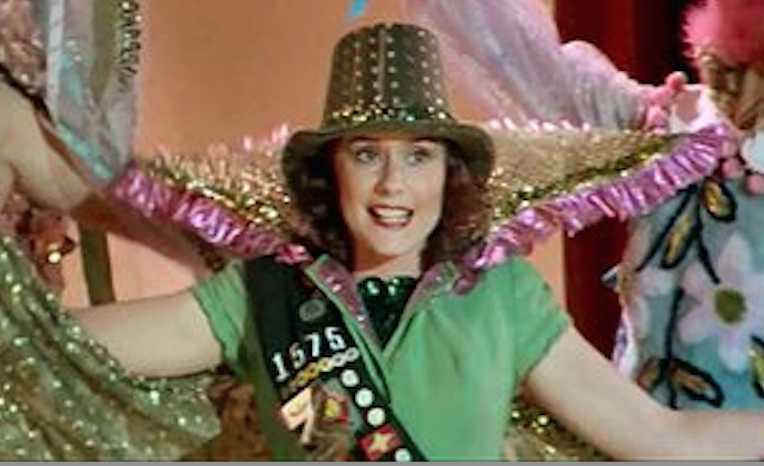
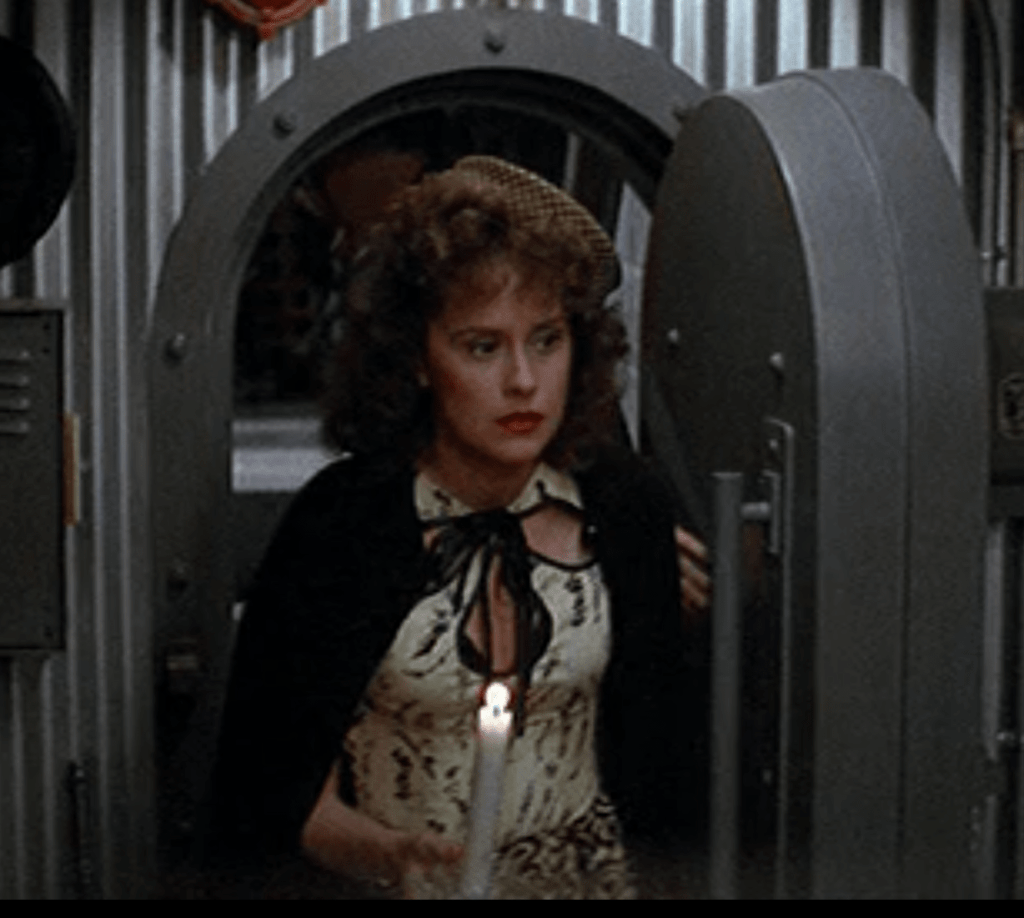

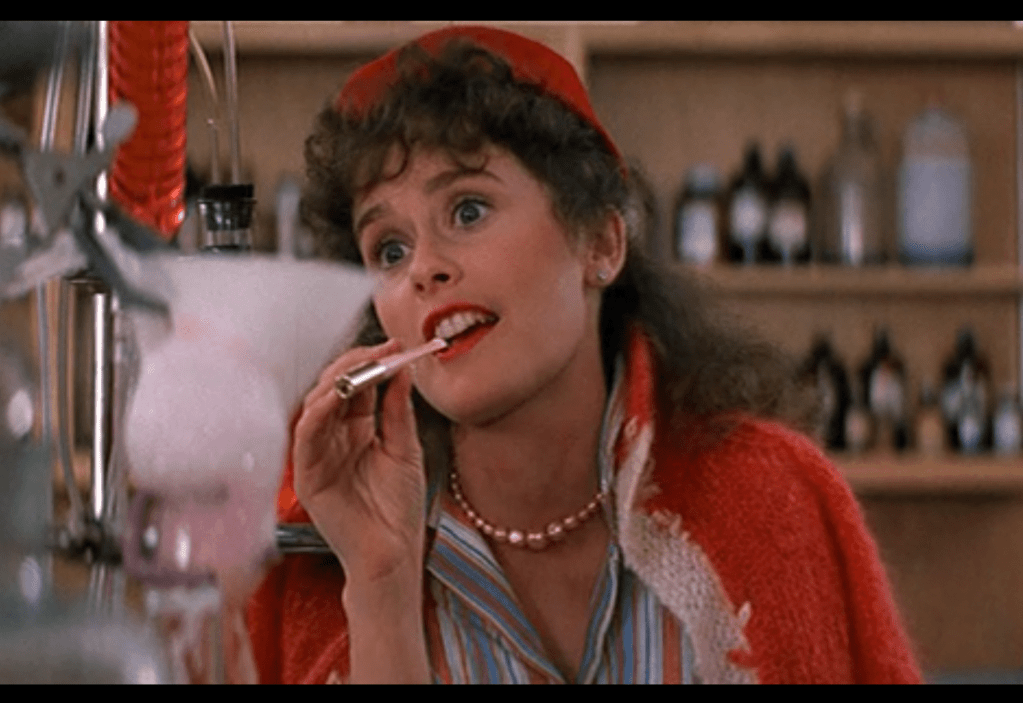
Even women in minor roles are depicted in a powerful light. Miss McGee is a tour-de-force as the matriarchal Principal of Rydell High. She is in her early seventies and unmarried, which only serves to bolster her liberation from the confines of the patriarchy – everything she has achieved she has necessitated on her own. One assumption could be she achieved her position by focusing on her career, rather than family; a path much more commonly traversed by men. Inadequate parental leave policies and antiquated attitudes surrounding child-rearing often mean that competent, qualified women are overlooked for career progression due to sexist expectations around having and raising children.
The role of the Principal is one intrinsically linked with power and responsibility. Miss McGee’s kind-yet-firm authority over her staff and students is exhibited any time she is on screen.
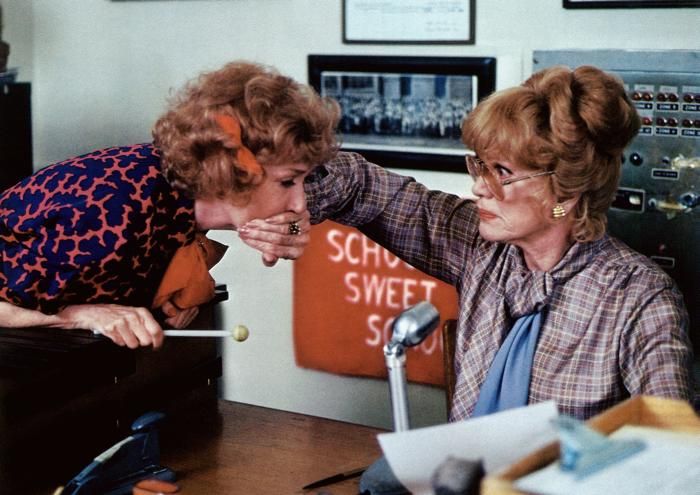
She is respected and feared even by the chauvinistic T-Birds who would rather swallow their lit cigarette than experience her wrath.
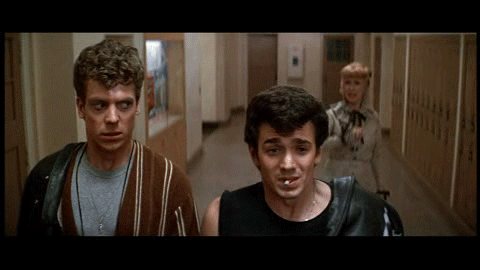
So next time you are perusing Binge or Paramount+, give Grease 2 a chance. Your inner film snob may cringe but the feminist and fashionista in you will rejoice!

